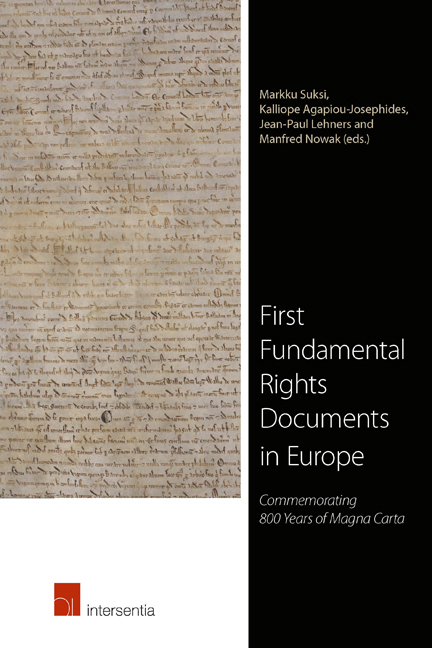Book contents
- Frontmatter
- Preface
- Contents
- List of Authors
- 1 Introduction
- PART I
- 2 The United Kingdom: From Magna Carta 1215 to the Rule of Law
- 3 Ireland: Individual and Group Rights in Ancient Irish Law
- 4 Italy: The Liber Paradisus — A Vision of Good Governance
- 5 Hungary: The Historic Constitution as the Place of Memory
- 6 Belgium: From Collective Privileges to Individual Rights
- 7 Austria: Manorial Regulation of Mining and Use of Forests as Potential Antecedents in Fundamental Rights
- 8 Spain: The First Cry for Justice in the Americas — From Antonio de Montesinos to the Laws of Burgos (1512)
- 9 Lithuania: From Equality to Inequality and to Equality Again
- 10 Poland: From the Golden Liberty of the Nobles to Fundamental Rights
- PART II
- Index
4 - Italy: The Liber Paradisus — A Vision of Good Governance
from PART I
Published online by Cambridge University Press: 15 December 2017
- Frontmatter
- Preface
- Contents
- List of Authors
- 1 Introduction
- PART I
- 2 The United Kingdom: From Magna Carta 1215 to the Rule of Law
- 3 Ireland: Individual and Group Rights in Ancient Irish Law
- 4 Italy: The Liber Paradisus — A Vision of Good Governance
- 5 Hungary: The Historic Constitution as the Place of Memory
- 6 Belgium: From Collective Privileges to Individual Rights
- 7 Austria: Manorial Regulation of Mining and Use of Forests as Potential Antecedents in Fundamental Rights
- 8 Spain: The First Cry for Justice in the Americas — From Antonio de Montesinos to the Laws of Burgos (1512)
- 9 Lithuania: From Equality to Inequality and to Equality Again
- 10 Poland: From the Golden Liberty of the Nobles to Fundamental Rights
- PART II
- Index
Summary
INTRODUCTION
In this chapter it is argued that the ‘first document’ in Italian history in which ‘fundamental rights’ were affirmed is an arbitration award issued by the city of Bologna in 1256 and formalised in 1257 proclaiming, within the entire territory of the town, the liberation of slaves (servi et ancillae) belonging to local landlords and bonded de iure or de facto to the masters and their land. The 1257 document was known as Liber Paradisus (the Heaven Book), and was complemented by statutes in 1257, 1282 and 1304 extending the measure to serfs (servi glebae, adsripticii and other categories of villeins).
In the first section, I provide a very short outline of Italian constitutional history, focusing on two documents of the eighteenth century that marked a remarkable shift in the history of European constitutionalism and codification of individual rights, adopted respectively in Corsica and Tuscany.
In the subsequent sections, however, a discussion of some methodological aspects connected to the topic eventually leads us to another moment in pre-modern history in which the quest for the first Italian document on fundamental rights may prove to be more fruitful. In the long history of Italian civilisation, a crucial transitional epoch can be identified in the decades of the High Middle Ages, when the affluent city-states of Central and Northern Italy fought against the Holy Roman Empire for self-government and independence. In this framework, internal conflicts also erupted within the towns opposing aristocratic and proto-bourgeois factions. The Liber Paradisus was drafted in Bologna against this backdrop of political turmoil and class conflict.
The following sections then describe the normative content of the Liber and of some of the subsequent acts that complemented it, trying to explain its original character and legal effects. The Liber documents the city of Bologna's policy of liberating slaves and granting some liberties to certain groups of people hitherto under the control of aristocratic families. The original aim of such emancipation acts, in Bologna as well as in other towns, was essentially to increase the tax revenues of the municipality. However, in this case, a Preamble to the document, emphatically linking the measure to ‘universal’ values stemming from the Bible and Roman law, justifies a comparison with modern declarations of rights.
The final sections further discuss and contextualise these parallels and, from this, some conclusions will be drawn.
- Type
- Chapter
- Information
- First Fundamental Rights Documents in EuropeCommemorating 800 Years of Magna Carta, pp. 39 - 56Publisher: IntersentiaPrint publication year: 2015



